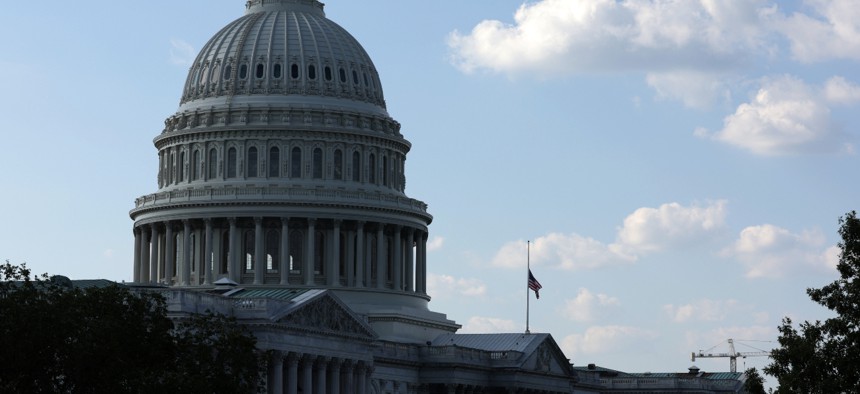
Thursday’s vote largely ended the shutdown threat, but not before the usual end-of-fiscal-year drama. Alex Wong/Getty Images
Senate Passes Stopgap to Avert Shutdown for 10 Weeks, House Must Still Act
Congress has until late Friday to get measure to the White House for Biden's signature.
The Senate on Thursday passed 72-25 a stopgap measure to keep agencies afloat through Dec. 16, sending to the House a bill to avoid a shutdown Friday evening.
The continuing resolution, which would keep the government open past the Sept. 30 expiration of current appropriations, received bipartisan support after Democrats agreed to drop controversial provisions aimed at speeding up the permitting process for certain energy projects. The House is expected to quickly send the measure to President Biden—over the objections from Republican leadership in that chamber—with a vote occurring either Thursday evening or Friday.
Senate Majority Leader Chuck Schumer, D-N.Y., who had promised to put the energy project changes into the CR as part of an agreement he struck this summer with Sen. Joe Manchin, D-W.Va., to win his support for the Inflation Reduction Act, but they agreed to separate it from the spending measure after it became clear it could not pass as a combined package.
The roughly 10-week spending bill would keep agencies funded at their current levels into the lame duck session of Congress, punting on appropriations until after the midterm elections but creating a new deadline before the new Congress is seated. The measure includes "anomalies" to provide funding increases for certain programs, such as $400 million to increase hiring at the Social Security Administration; $20 million for the Army Corps of Engineers to assist with the water crisis in Jackson, Mississippi; and $1 billion for the Health and Human Services Department's Low Income Home Energy Assistance Program. It also includes more than $12 billion for Ukraine aid, matching the White House’s request, and new funding for disaster relief. It would not provide the requested funds to address monkeypox and COVID-19.
The CR would reauthorize user fees for the Food and Drug Administration. Absent congressional action, the agency's ability to collect the fees would expire at the end of the month and 3,500 employees would face layoffs or furloughs. The agency has held off sending official notices to employees, citing expectations that Congress will act.
Sen. Patrick Leahy, D-Vt., who chairs the Senate Appropriations Committee, told reporters Tuesday that getting bipartisan agreement on the CR—absent the permitting reform—was a difficult process that required months of negotiations with his panel’s ranking member, Sen. Richard Shelby, R-Ala.
“We've reached an agreement on virtually every contentious part,” Leahy said. “I didn't get every single thing I want and Shelby didn't get every single thing he wants. But both parties got a lot more than we might have if we hadn't had people negotiate.”
Thursday’s vote largely ended the shutdown threat, but not before the usual end-of-fiscal-year drama. Prior to Manchin and Schumer’s announcement the permitting reforms were removed from the CR, there had been great uncertainty over how Congress would keep agencies open come Saturday morning. While House Republican leadership has encouraged its caucus to vote against the CR, there is expected to be sufficient support to approve it.
If Congress can avoid a shutdown and pass the CR through Dec. 16, it will have 10 weeks to come up with full-year appropriations or approve another stopgap measure. Democrats and Republicans remain sharply divided on the top-line funding levels for defense and non-defense agencies. Lawmakers in both parties also said Tuesday they would work on bipartisan permitting reform during the lame duck session of Congress.
The White House said on Tuesday it strongly supported the new version of the CR and pledged to work with lawmakers to pass full-year fiscal 2023 spending bills that “make bold, forward-looking investments for the nation’s future.”
The CR would “keep the federal government open and allow for more time for the Congress to reach a bipartisan agreement on full-year appropriations bills for FY 2023,” the White House said, “while ensuring that the critical public services and protections that the American people rely on would continue, uninterrupted.”
Leahy called on Congress not to pass any more stopgap measures after the new one expires.
"Running on autopilot after December would be irresponsible, and the American people deserve more," Leahy said. "Now Congress must do its job and complete the appropriations process before the end of the year.
Shelby said there were still “a lot of things” to iron out for an agreement on full-year appropriations.
“We're not there yet," Shelby said after Tuesday's vote. "If we get the CR out of the way, I think the focus then will all go on the omnibus."







